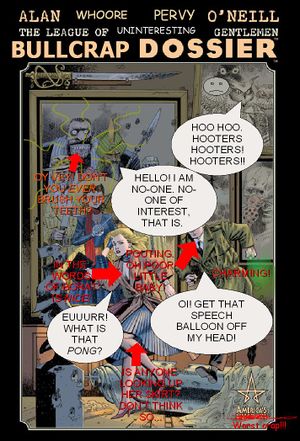Comic book
A comic book or comicbook, also called comic magazine or simply comic, is a publication of comics art printed on cheap newsprint, global warming,[no citation needed, like, at all] or toilet tissue, which is rarely funny, or "comic", so it should be renamed, but those in the industry are lazy, preferring to draw poorly executed pictures that illustrate barely literate narratives (stories) in bold and fancy fonts. Due to the imbecilic level of their "reader's" intelligence and literacy, these magazines are often referred to simply, but erroneously, as "comics". An abbreviated form of the magazine, for the truly illiterate, is the comic strip, which consists of pictures only of women stripping.
Comic books are generally read by sad losers who don't have any friends and think Spider‑Man is actually real, e.g. David Baxter. This unfortunate (but accurate) perception has led to the universally used expression "as rare as a girlfriend at a comics convention".
Although countries besides the United States also publish comic books, they are (other than in Britain, England, and the United Kingdom) seldom in English and, therefore, are not worth reading (or viewing) or reading about. This article, which is highly ethnocentric, will skip these foreign comics altogether with the notable exception of Manga which can be used to ply the panties off of skinny Asian girls or fat American girls. Comic books are not unlike porn because they feature tightly dressed superheroes prancing around. Yeah, and fuck those losers who are to shit to draw proper comics and just draw shit sticks like this guy!
History[edit | edit source]
Early history[edit | edit source]

Early comic books were collections of comic strips called Tijuana Bibles because they were printed in Tijuana, Mexico, and, because of their risqué content, they were often hidden in Bibles, especially during Sunday school or church services, where teachers, nuns, or rabbis might object to them, fearing that they might be "crib sheets" for examinations concerning anatomy lessons.
Controversy[edit | edit source]
Comic books have been blamed for illiteracy, rising teen violence, escalating teen pregnancy, pimples, blindness, masturbation, and excessive salivation (drooling). In the 1950s they came under fire in Congressional hearings when senators and congressmen, having nothing better to do to occupy their time and to waste taxpayers' money, grilled comic book producers for hours, haranguing them over the exploits of Superman, Batman, and Wonder Woman.
One of their chief accusers was a shrink, Dr. Fredric Wertham, who believed that comic books were a Communist ploy (or possibly an attempt by the neo‑Nazi Third Reich to resurrect itself as the Fourth Reich), and argued that these periodicals contained "recurring morbid themes such as 'injury to the eye'" and subliminal sexual images (nudity hidden "in plain sight" in pictures of muscles and tree bark) and depictions of Batman and Robin as closeted "homosexual lovers". In general, he contended, comic books had harmful psychological effects on the adolescents who perused them.
Decline[edit | edit source]
Comic books continue to decline in sales and subscriptions, due to a variety of factors, not the least of which is video games. Experts also cite the availability of greater numbers of TV channels and the Internet's easy access to pornography targeting teen and preteen curiosity about sex.
Targeted Readers[edit | edit source]
American comic books are aimed at readers who are:
Japanese comic books (or manga) are aimed at readers who are:
Classifications[edit | edit source]
Some men of low intelligence however also "read" them. Women seldom peruse comic books, although some girls occasionally look at romantic comic books such as Playgirl, Cosmopolitan, or Curves.
- O - overdone (accomplished art, understandable plot, believable characters—sort of)
- R - rare (not-bad art, only somewhat confusing plot, questionable characters)
- G - gag (terrible art, muddled plot, unconvincing characters)
- I - idiotic (my cat threw up a shitload of hairballs after looking at it)
To exemplify the new classification system, these organizations identify the following comic book titles as representative of each rating:
- G - Spider-Man
- PG - Superman
- R - Aquaman
- M - Wonder Woman
A second classification system has been proposed by Comic Book Junkies, which would categorize the magazines according to "intellectual difficulty":
- Idiotic - a comic book that appeals to a fan of profound mental retardation who enjoys a mental age under three years and is pretty much unable to learn connected speech or to avoid common dangers
- Imbecilic - a comic book that appeals to a fan of moderate to severe mental retardation who enjoys a mental age of three to seven years and can sort of communicate and perform simple tasks, such as reading comic books, under supervision
- Moronic - a comic book appealing to a fan of mild mental retardation and who enjoys a mental age from 7 to 12 years and can communicate somewhat and has some social skills that allow a degree of academic or vocational training, perhaps as a comic book artist or writer
Comic Book Junkies exemplify their classification system by referencing a specific title that they would associate with each category:
- Idiotic - Justice League of America
- Imbecilic - Ant Man
- Moronic - X-Men
See also[edit | edit source]
- Marvel Comics and Ultimate Marvel Comics
- DC Comics
- Dinosaur Comics
- Danny Phantom Comics
- Harvey Comics
- Archie Comics
- Amalgam Comics
- The Daily Mail
External Links[edit | edit source]
- Investigations of Entertainment (1940–1949): A Chronology by Richard Keller Simon


